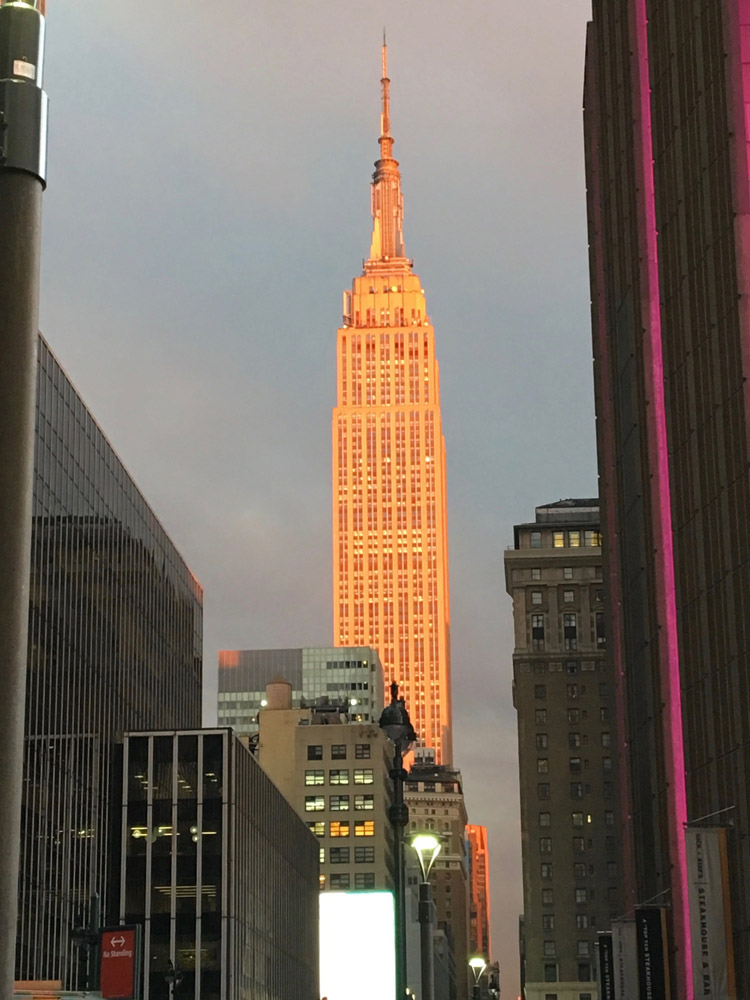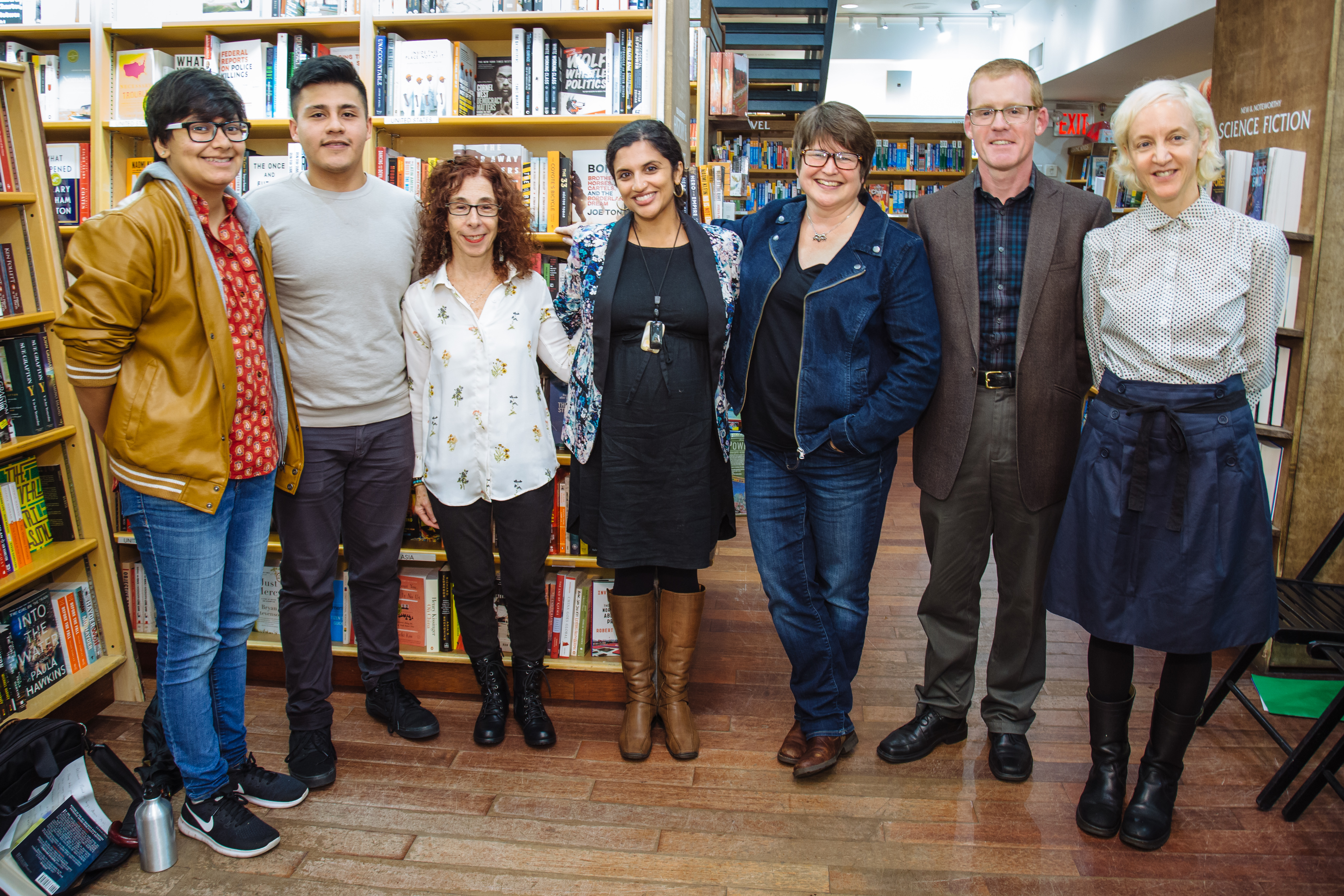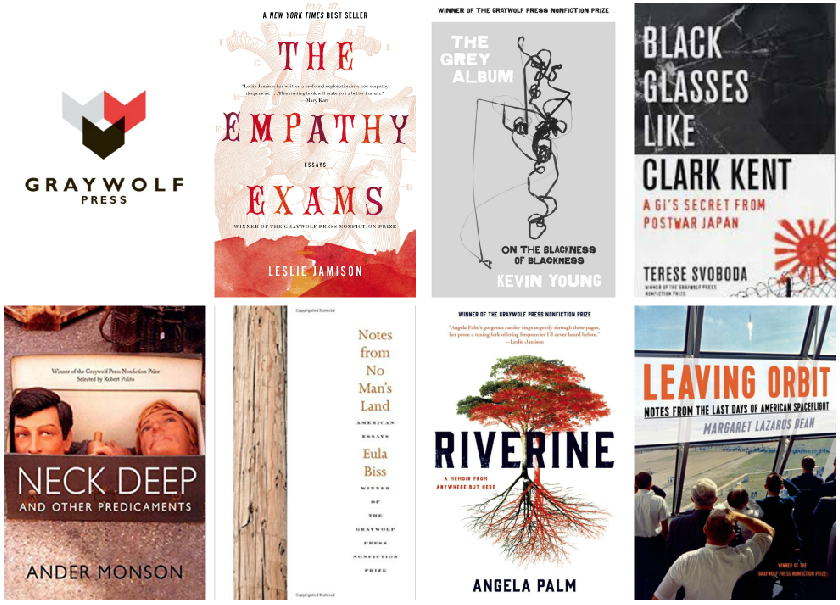Your Happy Place
“The happiest places incubate happiness for their people,” writes Dan Buettner in National Geographic about findings from the annual World Happiness Report that revealed that three-quarters of human happiness is driven by six factors. These include: strong economic growth, healthy life expectancy, quality social relationships, generosity, trust, and freedom to live the life that’s right for you. Write a poem that examines how your personal happiness is connected to your location and environment. How does living in your home, neighborhood, city, state, or country affect your general feelings of contentment or joy? Think of specific memories of happiness, and explore how a particular location might have contributed in direct or indirect ways to your feelings.
The Journey
Brian Evans-Jones immigrated to southern Maine from Hampshire, U.K. in 2014. He received his BA in English Literature and Creative Writing from the University of Warwick, U.K., and was poet laureate of Hampshire, U.K. from 2013 to 2014. He received his MFA from the University of New Hampshire in 2016. His poems have appeared or are forthcoming in Outlook Springs, Stoneboat Literary Journal, and the Cafe Review. Evans-Jones is a juried teaching artist in both Maine and New Hampshire, and teaches poetry and creative writing in schools, colleges, and community venues.
 You are a poet—or you think you are: perhaps you have never been sure. After all, you don’t have the four or five books to your name that you thought you’d have by now. A couple of competition wins, an award or two, yes, but no book. It seems so complicated, so difficult, this business of getting published. You live in a small town, in a rural state, far away from the publishing centers of America; the editors and poets who throng there seem so far above you.
You are a poet—or you think you are: perhaps you have never been sure. After all, you don’t have the four or five books to your name that you thought you’d have by now. A couple of competition wins, an award or two, yes, but no book. It seems so complicated, so difficult, this business of getting published. You live in a small town, in a rural state, far away from the publishing centers of America; the editors and poets who throng there seem so far above you.
But you try. You enter awards, send to magazines. The magazines all say no. In April, you get a missed call, a New York number—probably a scam. There is a voicemail, from “Bonnie.” It’s not a scam. You have won Poets & Writers’ Maureen Egen Writers Exchange Award—you are going to New York City.
Six months later, you arrive. The buildings are enormous, the streets teeming. You meet Bonnie Rose Marcus, director of Readings & Workshops (East) and the Writers Exchange, tiny and beaming, and go out for dinner with Joan Dempsey, the fiction winner, who fast becomes a good friend. Your nerves are tingling; you almost dread the thought of meeting your first guests tomorrow, these poets who have made it, who have books and books; these editors of famous magazines. What will you ask them, that won’t sound ridiculous? Will they look down on you, will they expect you to know all the poets and trends that you don’t?
Morning comes. Bonnie guides you; the streets seem less alien. The first meeting is with Patricia Carlin, poet and editor. You meet at a coffee shop, get a quiet table in the corner. You’re so nervous, you can’t remember what you said. It doesn’t matter. She’s gracious, interested, friendly. You talk about assembling collections, the benefits and downsides of small presses and regional presses, places to network. She asks if one of your winning poems is available for her magazine, and gives you her card.
Now you feel better. This is going to be okay—maybe even fun. In the next meetings, with agents and other fiction folk, you relax. From the sidelines, you see that all these people—big, important New York City people—are just people: interested in writers, passionate about literature, interested in you.
At dinner, editors from A Public Space, Four Way Books, and Hanging Loose Press discuss magazine life, small press life, poetry. You see that editors simply want their work to be thoughtfully read, the same as you do. Submissions, you realize, can be not a battle, but a communication—maybe even an offering. Someone will like your work—if you take the time to learn what they like first.
The days zoom by. Breakfast with a writer, coffee with an agent, lunch with another writer, tea with a publisher. You grow comfortable with the routine, with the city, with the important New York folk. You meet the president of Farrar, Straus and Giroux and feel entirely at your ease. You love hearing gossip about the Iowa Writers’ Workshop. Kate Angus tells you eight small presses she thinks would appreciate your aesthetic. The tour of the New Yorker offices is unforgettable.
Suddenly, it’s the end. You’re going home, to your small town, your green and quiet state. Nothing has changed there—but when you sit in your placid town library, New York feels close. You start work on your manuscript. You are a poet. You are ready.

The Maureen Egen Writers Exchange Award is generously supported by Maureen Egen, a member of the Poets & Writers Board of Directors.
Photos: (top) New York City skyline (Credit: Brian Evans-Jones). (bottom, left to right) R&W fellow Sreshtha Sen, R&W program assistant Ricardo Hernandez, R&W (east) director Bonnie Rose Marcus, 2017 WEX fiction judge Tania James, Joan Dempsey, Brian Evans-Jones, and 2017 WEX poetry judge Cynthia Cruz (Credit: Margarita Corporan).Upcoming Contest Deadlines in Fiction and Nonfiction
Prose writers: If your 2018 resolutions involve submitting to more contests, you’re in luck! Below is a selection of fiction and nonfiction contests with a deadline of January 15. Each contest offers a prize of at least $1,000 and publication.
Hidden River Arts Sandy Run Novella Award: A prize of $1,000 and publication by Hidden River Arts will be given annually for a novella. The editors will judge. Entry Fee: $24
Literal Latté K. Margaret Grossman Fiction Award: A prize of $1,000 and publication in Literal Latté is given annually for a short story. Entry Fee: $10
Breakwater Review Fiction Contest: A prize of $1,000 and publication in Breakwater Review is given annually for a story. Joan Wickersham will judge. Entry Fee: $10
Third Coast Fiction Contest: An award of $1,000 each and publication in Third Coast is given annually for a short story. Danielle Evans will judge. Entry Fee: $18
Masters Review Short Story Award for New Writers: A prize of $3,000 and publication in Masters Review is given twice yearly for a short story by a writer who has not published a novel. Writers who have published story collections are eligible. The winning story will also be sent to a participating literary agency. Entry Fee: $20
Moment Magazine–Karma Foundation Short Fiction Contest: A prize of $1,000 and publication in Moment Magazine is given annually for a story that relates to Judaism or Jewish culture or history. The editors will judge. Entry Fee: $25
Australian Book Review Calibre Essay Prize: A prize of AUD $5,000 (approximately $3,800) and publication in Australian Book Review is given annually for an essay. A second-place prize of AUD $2,500 (approximately $1,900) is also given. Andrea Goldsmith, Phillipa McGuinness, and Peter Rose will judge. Entry Fee: $25
Ellen Meloy Fund Desert Writers Award: A prize of $5,000 is given annually to enable a creative nonfiction writer “whose work reflects the spirit and passions for the desert embodied in Ellen Meloy's writing” to spend creative time in a desert environment. No entry fee.
North Carolina Writers’ Network Rose Post Creative Nonfiction Competition: A prize of $1,000 is given annually for an essay that “is outside the realm of conventional journalism and has relevance to North Carolinians.” The winning essay will also be considered for publication in Ecotone. Benjamin Rachlin will judge. Entry Fee: $12
Visit the contest websites for complete guidelines, and check out our Grants & Awards database and Submission Calendar for more upcoming contests in poetry, fiction, and nonfiction.
Instant Message
As writers, we tend to put up a wall between our creative writing (poems, stories, essays) and our more ordinary writing (to-do lists, e-mails). This week, try poking a hole in that wall. Think back and reflect upon an e-mail you received recently that startled you, that brought you unexpected happiness or unexpected pain. Or reflect on a recent to-do list you’ve written for yourself. Write an essay that feels as immediate as these messages or lists. Think about where you were physically and emotionally when you read or wrote these words. What does this say about you in this moment in time?
Submissions Open for Graywolf Nonfiction Prize
Submissions are open for the 2018 Graywolf Press Nonfiction Prize, given biennially for a nonfiction manuscript-in-progress by a writer not yet established in the genre. The winner will receive $12,000 and will work with the Graywolf editorial team to complete the project for publication.
Writers who reside in the United States are eligible; no prior publication is required. Submissions to the prize may include memoir, essay, biography, and history. Using the online submission system, submit a one-page cover letter, a two- to ten-page overview of the project, and at least 100 pages of the manuscript by January 31. There is no entry fee.
The editors will judge. “The [prize] emphasizes innovation in form, and we want to see projects that test the boundaries of literary nonfiction,” write the editors. “We are less interested in straightforward memoirs.”
Esmé Weijun Wang won the prize in 2016 for The Collected Schizophrenias, an essay collection that addresses the social, historical, medical, and spiritual aspects of schizophrenia. Angela Palm won in 2014 for her book about growing up in a small river town in rural Indiana, Riverine: A Memoir From Anywhere But Here. Margaret Lazarus Dean won in 2012 for Leaving Orbit: Notes From the Last Days of American Spaceflight, and Leslie Jamison won in 2010 for The Empathy Exams.
Founded in 1974, Graywolf Press is considered one of the leading nonprofit literary publishers in the country. The press is “committed to the discovery and energetic publication of contemporary American and international literature.” Visit the website for more information.
Reclaimed by Nature
In her new photography series titled “Home,” Gohar Dashti explores the interiors of houses in her native Iran that have been abandoned and reclaimed by nature. The images create an ambiguous effect; an old bedroom overrun with wildflowers is lovely in one sense, but also hints at a darker history. What happened in these houses and why did the people who once lived in them leave? This week, imagine what it would look, sound, and smell like, and how it would feel to have your childhood home overtaken by nature. Try using this eerie space as the setting for a short story.
The Daily Mirror
In 1996, David Lehman gave himself the task of writing a poem a day and continued for the next two years. The best of these resulting poems became his collection The Daily Mirror: A Journal in Poetry. In the introduction, Lehman says of his writing process: “Inspiration was not something you needed to sit and wait for. It was something that came when you invited it.” This week, instead of waiting for inspiration, try to simply reach your hand out and gather some. Write down a list of observations each day from scraps of dialogue you overhear, images you encounter, and thoughts that cross your mind. Shape your daily observations into a poem and title each one with the date until you have seven for the week.
Seven Words
Poets Sarah Freligh and Amy Lemmon founded the CDC Poetry Project in response to a Washington Post report that the Trump administration had prohibited the Centers for Disease Control and Prevention from using seven words in their official documents for the 2018 budget. The project invites poets to submit poems that use all of the banned words, which include “vulnerable,” “entitlement,” “diversity,” “transgender,” and “evidence-based.” This week, choose two or more of these words as inspiration for a series of flash essays. Use the immediate energy of short prose to express what comes to mind when you hear these words.
Insect Armageddon
The Entomological Society Krefeld, a volunteer-run group of amateur insect enthusiasts, recently published their findings showing that the insect population they tested in nature preserves in western Germany had decreased by over 75 percent over the course of thirty years. This decline is thought to accurately reflect the insect species on a much larger and international scale. Write a short story that takes place in a world where there are no insects left. Aside from no longer needing to clean bugs off of car windshields, what are the repercussions given the integral role that insects play in the ecosystem? Does your story include a movement to bring insects back?





